Harvard science history professor Naomi Oreskes was one of the witnesses appearing under oath at the 10/23/19 House Committee on Oversight and Reform’s “Examining the Oil Industry’s Efforts to Suppress the Truth about Climate Change” hearing. A pair of missteps while responding to questions didn’t bolster her appearance as a detached, objective, expert witness on the complicated topic of alleged fossil fuel industry disinformation efforts. She also offered written testimony, … and in doing so about a couple of details, she once again reinforced how she’s not particularly adept about keeping her mouth shut on items that have the potential of opening up a Pandora’s Box about the history of the tactics used by enviro-activists to accuse skeptic climate scientists of being ‘industry-paid shills spreading disinformation.’
Regarding the unhelpful oral responses:
At the 1:27:38 point in the hearing, committee member Carol Miller (R-WVA) asked Oreskes if there was a flaw in her 2017 study of ‘Exxon disinformation,’ in which Oreskes and her co-researcher Geoffrey Supran referenced Exxon advertorials that were actually a collection of ads from Exxon and Mobil. It’s a sizable problem (complete story here) that seriously undermined her and Supran’s study. Oreskes answered by saying the current ExxonMobil is a company that “took on the assets and liabilities” of Mobil, a bit of a dodge to the question. The Oreskes/Supran study itself contains this dodge.
Aside: Excusing away such a fault with “well, it’s all one company now, and the whole industry has troublesome operations” is ludicrous. Imagine, for comparison, if researchers stated that the BNSF railway knew they had highly problematic operation policy within their system from 1989 to 2004, but the researchers failed to distinguish that the majority of the problems were in the Burlington Northern system prior to 1995, while also being unable to state that BN merged with the Santa Fe railway in 1995.
But partway through her answer, Rep Miller interrupted to ask when Exxon and Mobil merged. Oreskes did not know, and when turning to Supran for help, he didn’t know, either.
That was awkward. She is a historian, and Supran supposedly helped gather info for their infamous 2017 study.
Later, committee member Chip Roy (R-TX) followed up (1:49:14 point) by asking Oreskes if she agreed fundamentally that scientific studies such as hers and Supran’s should be conducted in a manner that doesn’t dictate results or use methodology which results in biased outcomes. Oreskes agreed, whereupon Rep Roy asked if she had tweeted two years before her and Supran’s study, “Did Exxon deliberately mislead the public on climate change? Hello. Of course they did!,” to which Oreskes said “I believe it was after the report, but I could check on that.”
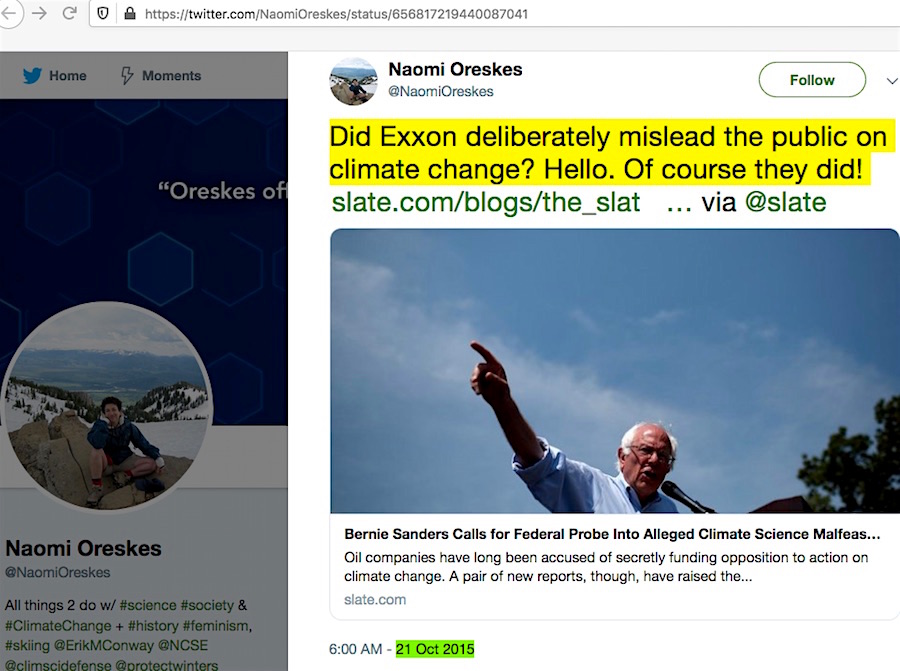
Oops. Studies containing cherry-picked results by researchers who demonstrate unmistakable bias against their research topic doesn’t look good at all.
Now, regarding Oreskes’ unhelpful Prepared Written Testimony, we have the following, respectively, from pages 6 and 7:
The fossil fuel industry has also promoted disinformation through the activities of “third-party allies”: other organizations and groups, with whom they collaborated on messaging, helped to fund, or helped to create. These included the Global Climate Coalition, the Cooler Heads Coalition, Informed Citizens for the Environment, and the Greening Earth Society. …. Two of these groups—the so-called Informed Citizens for the Environment and the Greening Earth Society—were created and funded by a coal industry trade association, the Western Fuels Association, ….
…. A third way the industry has promoted disinformation is through their trade associations. In the early 1990s, the Western Fuels Association ran a media campaign across the country designed to undermine public support for climate action by promoting the message that it would be wasteful to spend money solving a problem that perhaps did not actually exist (Appendix 16)
Let’s examine the faults there in reverse order – it would be nice to see what’s in Oreskes “Appendix 16”, but so far, it is not available in her PDF testimony file or anywhere else on the internet at the present time. Nevertheless, the “media campaign across the country” Oreskes refers to was the only public relations campaign Western Fuels had at the time, notoriously titled the “Information Council for the Environment (ICE).” As I’ve already detailed, it was not seen all around the country.
Next, it is entertaining that Oreskes brings up Western Fuels’ Greening Earth Society, not seen among her material since her 2010 “How Well do Facts Travel?” book’s chapter five contribution, in which she thanked a person named Anthony Socci for bringing that group to her attention. The same Socci who she says added notes to a particular “Chicken Little” ICE newspaper ad — hold that particular thought for a moment — archived in a document file that is not where Oreskes said it was. The same Socci who was seen as a Senate staffer in association with a 1992 Senate hearing where Al Gore was grilling a skeptic climate scientist about connections to Western Fuels.
Finally, there’s Oreskes’ mentions of the “Informed Citizens for the Environment,” “so-called,” as though it was still some kind of a known entity. She knows better than that, having mentioned the correct public name for Western Fuels’ 1991 pilot project PR campaign before in her oft-cited 2008 Powerpoint presentation, and from being a direct participant in not one, but two Friends of the Court briefs this year which specifically mentioned the correct name (except for the word “on”, when it is “for“).
But she also mentioned it in the above noted book chapter contribution, in an unmistakable way:
The campaign strategists decided on an acronym before they decided what it stood for – ICE – and an early part of the program used focus groups to test potential names: “Information Council for the Environment,” “Informed Citizens for the Environment,” “Intelligent Concern for the Environment,” and “Informed Choices for the Environment.” The focus groups indicated that American citizens trusted scientists more than politicians or political activists – and much less than industry spokesmen – so Western Fuels settled on Information Council for the Environment because it positioned ICE as a “technical” source rather than an industry group. When the advertising campaign was launched, it operated under this name, with a logo of an outstretched hand holding a large plant emerging from the globe.
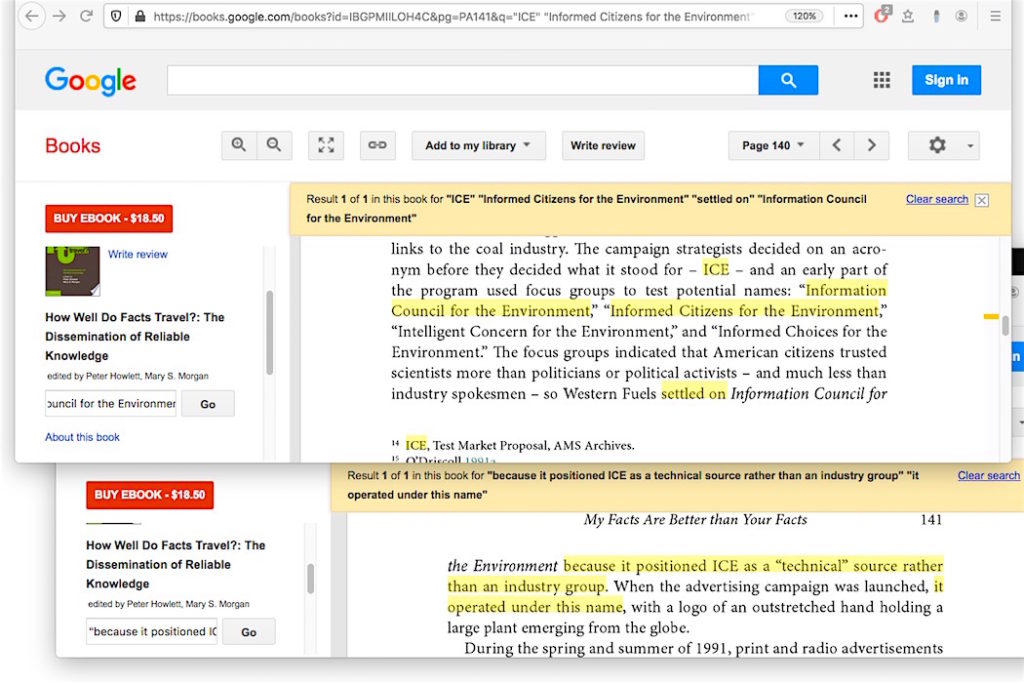
The problem with her assertion about the name choices is that, as the New York Times reported in 1991, that advice was never used. Ask people who were directly associated with the short-lived ICE campaign, and they will tell you that the particular set of name suggestions and strategy/targeting goals was an outright rejected proposal.
There’s an interesting twist to this last problem. Kert Davies, formerly at Greenpeace’s ExxonSecrets site (that anti-Exxon Kert Davies), has also implied that “Informed Citizens for the Environment” was an accepted alternative name for the ICE campaign at his current Climate Files documents website. Still holding the “Chicken Little ICE newspaper ad thought”?
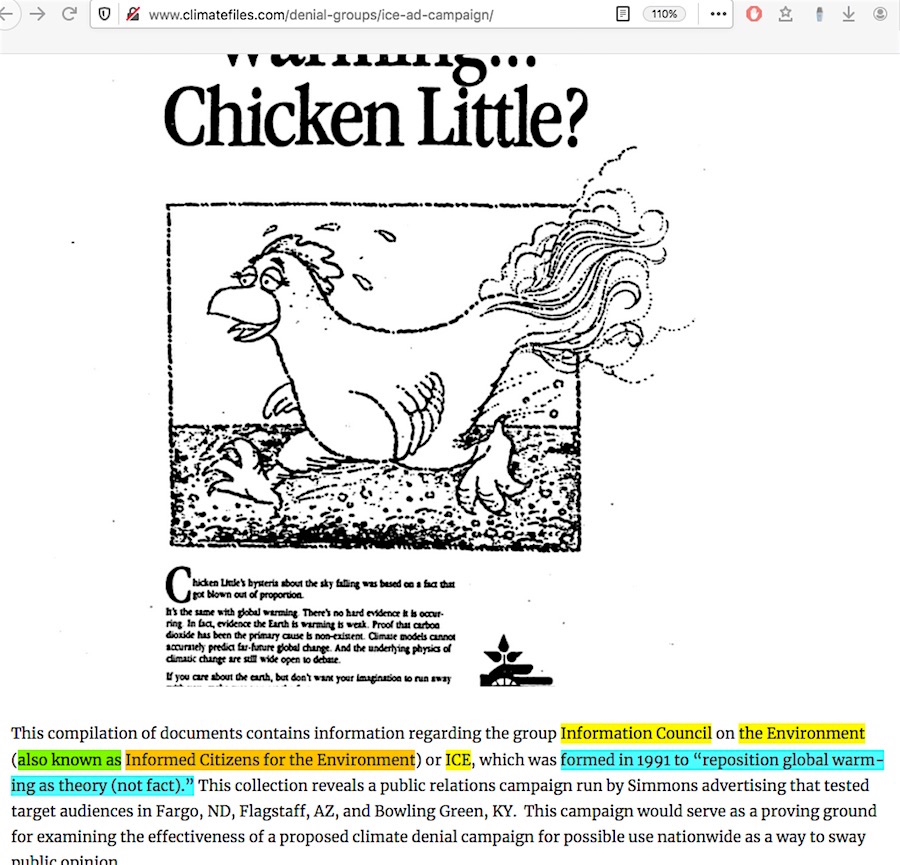
Notice the “outstretched hand holding a large plant emerging from the globe” logo at the bottom right? The same logo and ad appears ….. partially ….. at a page for the law firm handling nine of the current global warming lawsuits. Where does Davies scan copy of that ad trace back to? Greenpeace’s page 49 scan of the ICE campaign ads. What happens when you use Greenpeace’s own magnification tool at that page?
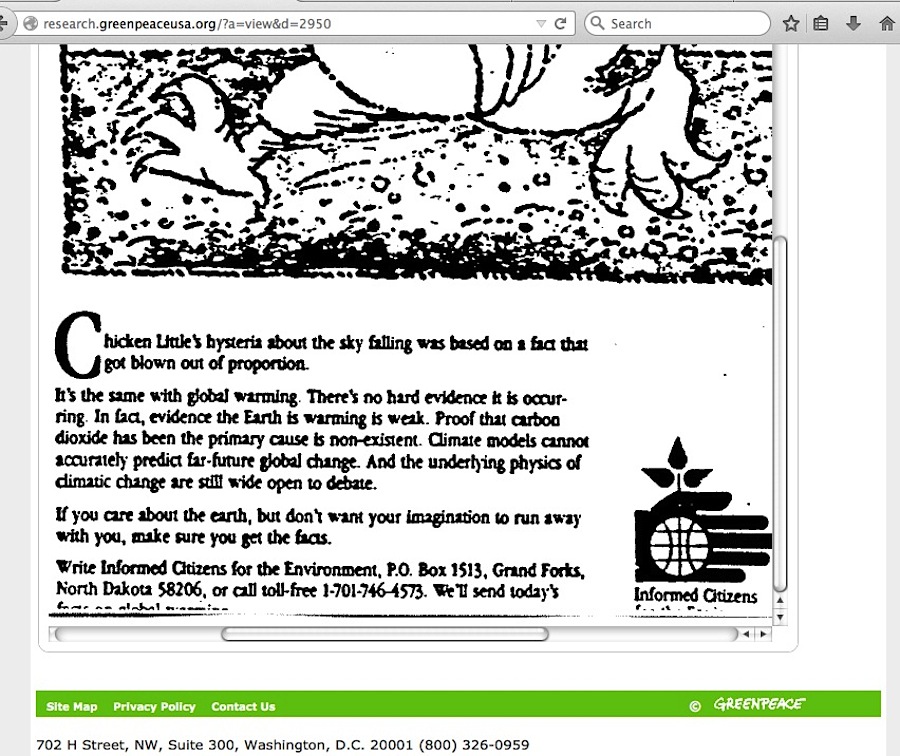
You see the unused name, “Informed Citizens for the Environment.”
Naomi Oreskes just pointed out a name that particular members of Greenpeace and a particular law firm doesn’t want you to see.
When the expectation was that Oreskes would offer devastating evidence at a House hearing that was supposed to prove the oil industry suppresses the truth about global warming, she didn’t actually point to any such suppression, and further undercut her credibility by twice stating the wrong name for a PR campaign which enviro-activists believe is the source for leaked memos (worthless memos, as it turns out) that supposedly prove the existence of industry-orchestrated / financed disinformation campaigns.
It’s a golden opportunity for congressional investigators to ask why ‘expert witness’ Oreskes can’t get her facts straight, and why the trail of Greenpeace’s ICE memo scans containing a rejected PR campaign name / strategy goal ….

…. and rejected targeting goals ….
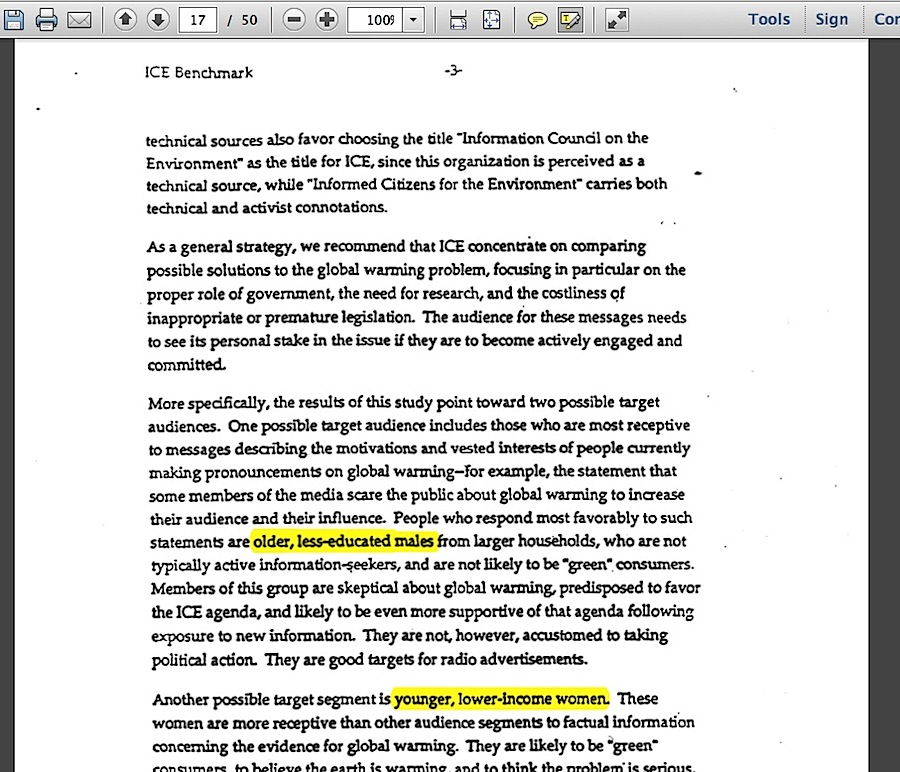
…. traces all the way back to Al Gore’s 1991-’92 Senate office.
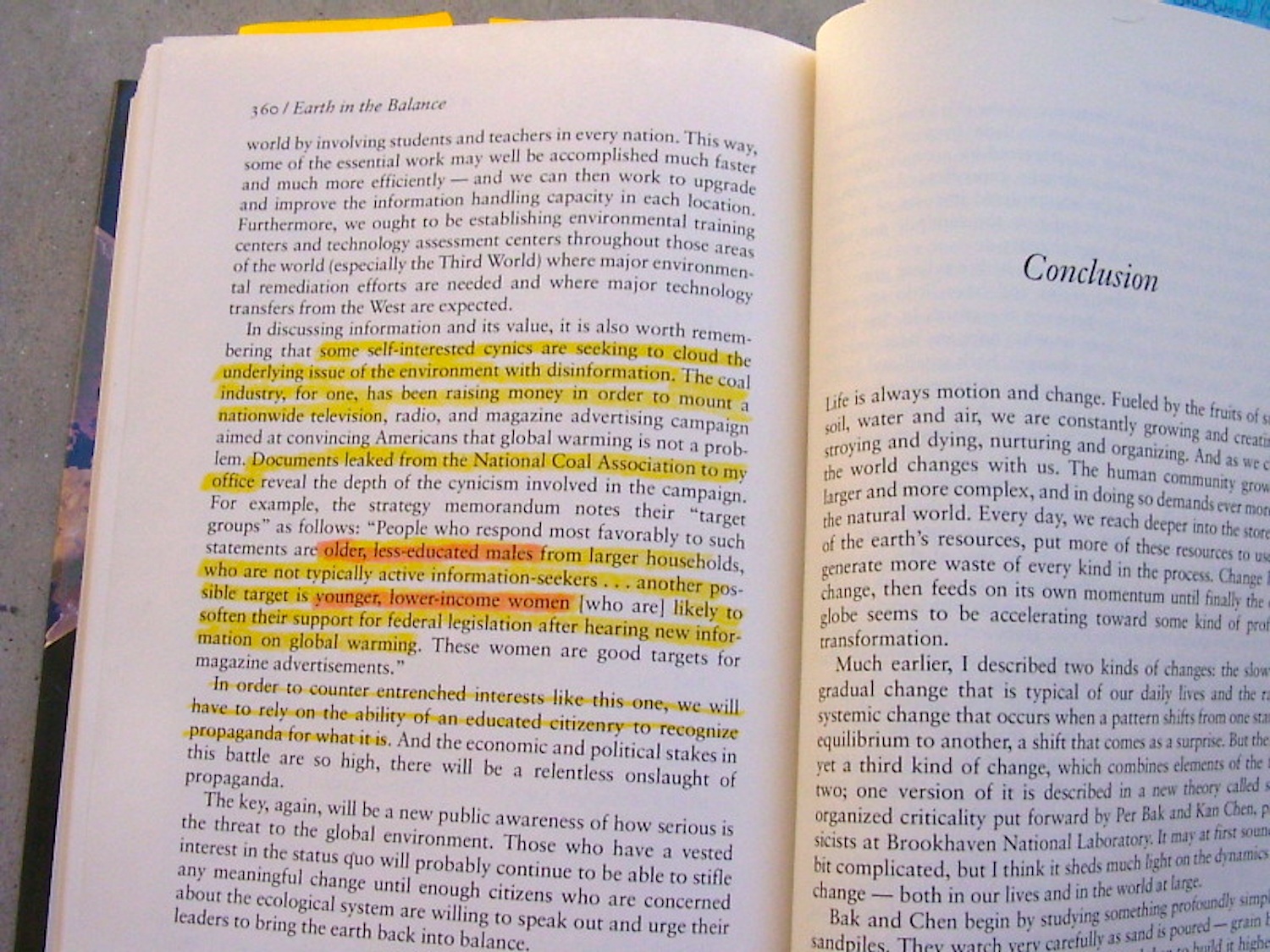
Gore, being the person who couldn’t get the corporation name right himself when he later repeated the strategy goal … among other subsequent errors of attribution.
This hearing may be the first time Naomi Oreskes ever faced pushback regarding her claims about alleged industry-coordinated disinformation efforts. Notice how evasive she became when Rep Chip Roy hinted at where the coordinated efforts of disinformation might actually be found. She responded by saying it was an “academic discussion” and managed to slide out of that awkward moment with a joke about how uncoordinated academia is ….. but her 2012 La Jolla workshop doesn’t look like it was batting around mere theoretical notions considering how subsequent action material popped up involving people supplying ‘Chicken Little ad evidence’ to global warming lawsuits, and/or having key leading roles in global warming lawsuits.
————————————————————————
Pt 2: Careful for what you wish for / “Trust us, these guys are guilty, and we can prove it when we find the evidence.”
